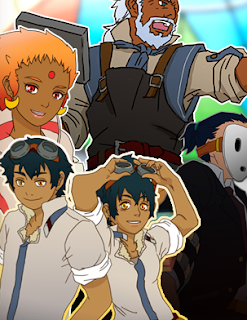5 Elements and Still Relevant
UPDATE: GSM put out a survey about the future!
Back in 2008 (seems like yesterday), E-Line Media in partnership with the Institute of Play, rolled out a new site, called Gamestar Mechanic, which was originally developed by Gamelab in partnership with the Academic Advanced Distributed Learning Co-Lab (AADL) at the University of Wisconsin-Madison. This is a site that aims to teach kids how to design their own games, with the premise that designing games builds:
In fact, despite starting strong with generous funding from the John D. and Catherine T. MacArthur Foundation for an original grant proposal by James Paul Gee, Ph.D and Eric Zimmerman and being a big part of the National STEM Video Game Challenge up through 2017, the site has seen little to no updates for quite awhile. There was talk of an iPad app, but it never came to fruition. I have to admit, that as a teacher who has lost access to so many great teaching tools (always in the area of game design and development, the most loved and popular component of my course), I am scared! I'm downright panicked that we are going to lose this too, and there is NOTHING to fill this void.
You may wonder, "Clint, do you know something we don't know? Do you have the 411 on some plan to shut down GSM?" No, I don't. I haven't know anyone at GSM, since Brian Alspach left the project. So I don't want to cause a panic. I hope it sticks around for a week or so, at least. I'm right in the middle of using it!
It is my sincere hope the Gamestar Mechanic is around for a long time to come and remains proudly displayed on E-Line Media's Projects Page.
What I do know is this. Adobe announced in July of 2017 that it was killing the Flash plugin by 2020. Gamestar Mechanic runs on the Flash Plugin. Flash will die, and it's taking a ton of free interactive educational content with it. Being that the GSM website hasn't migrated to Html 5 yet, and it hasn't seen any love in terms of it's Apprentice or Mentor Badges, I have grave concerns.
This may all sound a bit melodramatic, but as far as an actual sound curriculum in Game Design that Middle School students can comprehend and apply, Gamestar Mechanic is the only game in town. It's the only thing that simply and concisely takes students through designing balanced games (games with flow), using 5 Elements of Game Design while essentially using Gamification and Game Based Learning to do it. NO OTHER TOOL TEACHES GAME DESIGN as a distinct discipline.
Finally, a parting shot. As someone who has started playing games in recent years, I've noticed that if people value something in the private sector / for-profit market, there is a way to keep it alive. I play a few Private Server Games. This is where a game is dropped by the company that hosts it, and the source code is made available to private individuals who want to keep it alive for the love of the game. Basically something that was once a for-profit venture becomes a labor of love. This does not happen in education. When tools like Project Spark, Teach with Portals, or Game Kit Beta go away, they're gone. No one makes this material available to anyone. I tried with Game Kit, but was ignored. I'd like to see that change.
::Take the survey::
Back in 2008 (seems like yesterday), E-Line Media in partnership with the Institute of Play, rolled out a new site, called Gamestar Mechanic, which was originally developed by Gamelab in partnership with the Academic Advanced Distributed Learning Co-Lab (AADL) at the University of Wisconsin-Madison. This is a site that aims to teach kids how to design their own games, with the premise that designing games builds:
- Systems Thinking,
- 21st Century Skills,
- Creative Problem Solving,
- Art and Aesthetics,
- Writing and Storytelling,
- and creates a motivation for STEM learning.
In fact, despite starting strong with generous funding from the John D. and Catherine T. MacArthur Foundation for an original grant proposal by James Paul Gee, Ph.D and Eric Zimmerman and being a big part of the National STEM Video Game Challenge up through 2017, the site has seen little to no updates for quite awhile. There was talk of an iPad app, but it never came to fruition. I have to admit, that as a teacher who has lost access to so many great teaching tools (always in the area of game design and development, the most loved and popular component of my course), I am scared! I'm downright panicked that we are going to lose this too, and there is NOTHING to fill this void.
You may wonder, "Clint, do you know something we don't know? Do you have the 411 on some plan to shut down GSM?" No, I don't. I haven't know anyone at GSM, since Brian Alspach left the project. So I don't want to cause a panic. I hope it sticks around for a week or so, at least. I'm right in the middle of using it!
It is my sincere hope the Gamestar Mechanic is around for a long time to come and remains proudly displayed on E-Line Media's Projects Page.
What I do know is this. Adobe announced in July of 2017 that it was killing the Flash plugin by 2020. Gamestar Mechanic runs on the Flash Plugin. Flash will die, and it's taking a ton of free interactive educational content with it. Being that the GSM website hasn't migrated to Html 5 yet, and it hasn't seen any love in terms of it's Apprentice or Mentor Badges, I have grave concerns.
This may all sound a bit melodramatic, but as far as an actual sound curriculum in Game Design that Middle School students can comprehend and apply, Gamestar Mechanic is the only game in town. It's the only thing that simply and concisely takes students through designing balanced games (games with flow), using 5 Elements of Game Design while essentially using Gamification and Game Based Learning to do it. NO OTHER TOOL TEACHES GAME DESIGN as a distinct discipline.
- Tynker doesn't teach it.
- Code.org doesn't teach it.
- Minecraft edu, as cool as it may be, doesn't teach it.
- Microsoft MakeCode Arcade doesn't teach it.
- Unity doesn't teach it.
- Crippled by updates that constantly break the educational content and kits they crank out.
- Crippled by network security at any school that recieves Erate funding.
- Crippled by extremely large files, which must be downloaded to do anything.
- Professional grade makes it edu-impractical.
Parting Shot
Finally, a parting shot. As someone who has started playing games in recent years, I've noticed that if people value something in the private sector / for-profit market, there is a way to keep it alive. I play a few Private Server Games. This is where a game is dropped by the company that hosts it, and the source code is made available to private individuals who want to keep it alive for the love of the game. Basically something that was once a for-profit venture becomes a labor of love. This does not happen in education. When tools like Project Spark, Teach with Portals, or Game Kit Beta go away, they're gone. No one makes this material available to anyone. I tried with Game Kit, but was ignored. I'd like to see that change.







Great post. I am in the same boat. I am watching tech soar, but tools to teach it far and few between. Programs are either costly or too big to run on student devices.
ReplyDeleteWe have different agendas, but similar circumstances. I was really into Project Spark and am still using KODU. Very basic for upperclassmen, but perfect for 8-10th graders. I use game design to introduce coding.
Have you tried the SWIFT playground on the iPads or iOS devices ? Looked interesting, but might be a little "cody" for yours needs.
I'm with you on everything you wrote here -- I, too, am worried about the silence on the Gamestar end and the coming Flash problems (already sorta here) and what I might ever do to replace Gamestar when it goes under (may it not be soon). Like you, all of my contacts there are long gone ...
ReplyDeleteKevin
So, I have a little update. I received an email from GSM last week with a survey of where we'd like to see it go. Everyone please participate! Copy / paste the link from below:
ReplyDeletehttps://elinemedia.us5.list-manage.com/track/click?u=2644f8e55b9247ff3ab625a99&id=181e753713&e=7cc181298f